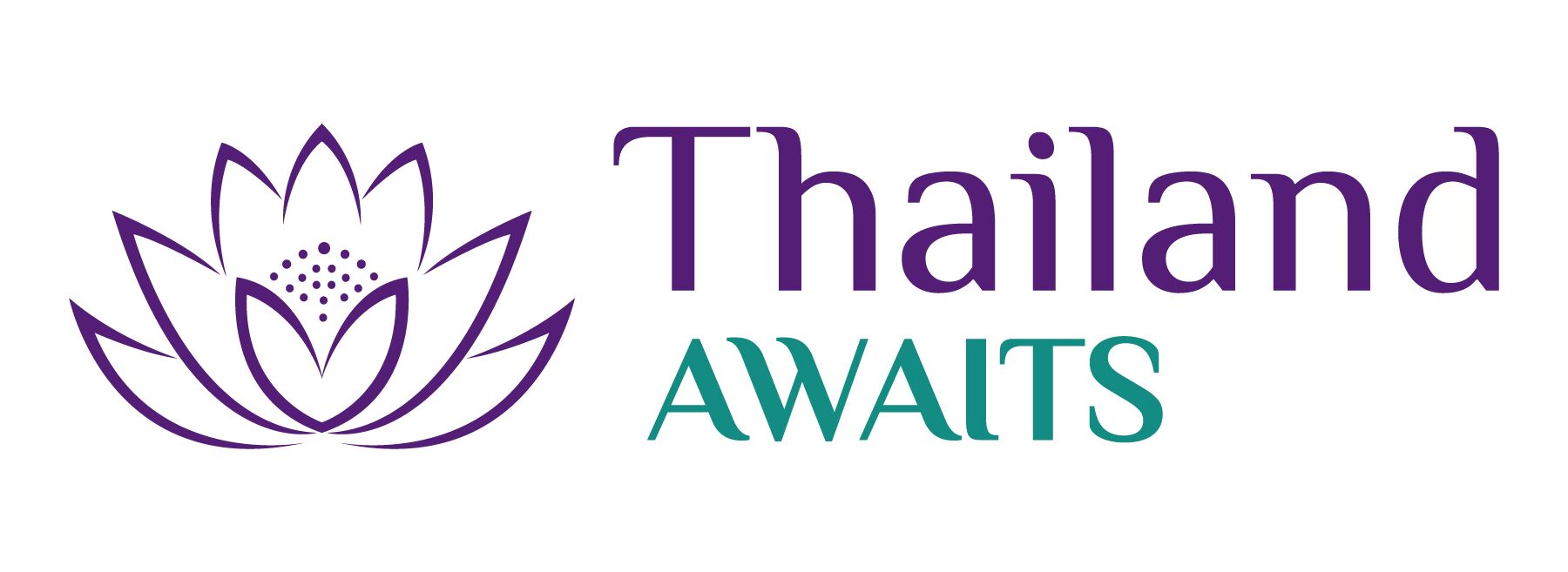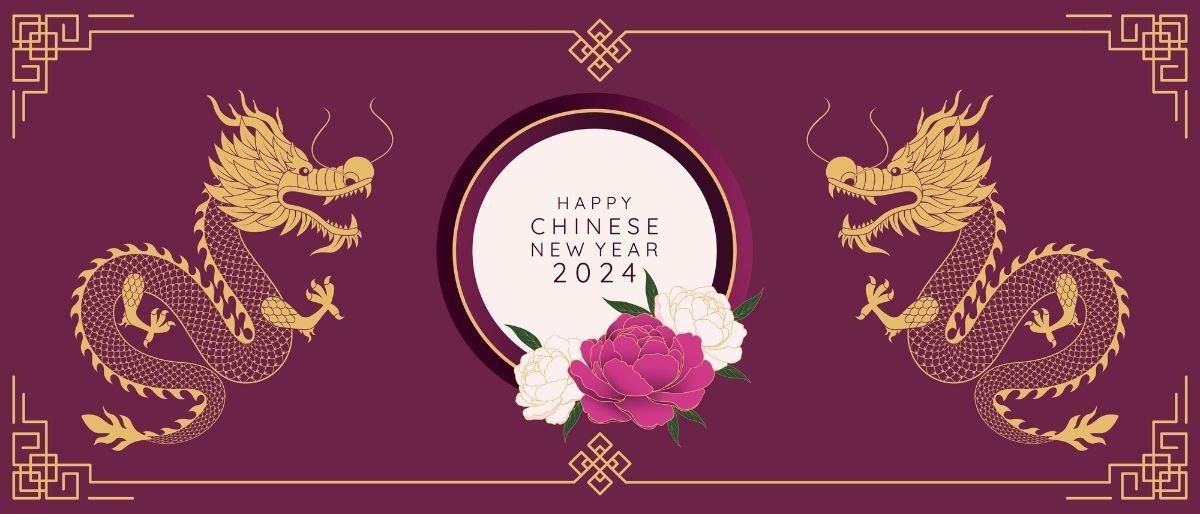Celebrating Chinese New Year in Bangkok [2024]
If you will be spending Chinese New Year in Bangkok this year you might not know what to expect. Well this handy guide will give you some background on what this time of year is like in Bangkok and also lists some of the celebratory menus available.
Do you know that the Chinese New Year, otherwise known as Lunar New Year or Spring Festival, is considered one of the most important holidays in the Chinese calendar? A time for grand celebration, Chinese New Year emphasises family gatherings and paying respects to ancestors – but it’s also a time to party.
In Bangkok Chinese New Year is celebrated, maybe not as vigorously as in other cities worldwide, but it’s still a meaningful two days for the Thai/Chinese people.
In 2024, following the lunar calendar, Chinese New Year will be celebrated from 9–11 February.
The Significance of Chinese New Year in Bangkok
Today’s modern Thai people descended from the Chinese. Back in the 8th to 10th centuries, the Tai people emigrated from mainland China to the area now known as Thailand. They settled in the north and slowly moved south. The majority of Thais can trace their ancestry back to the Tai people.
It’s estimated that today, almost 9% of the population of Bangkok is Chinese. With those kinds of numbers, it’s no surprise that Chinese New Year is celebrated here.
Then there are the Thai-Chinese. In the early 20th century, many Chinese immigrants travelled and then settled in Thailand. They married Thai ladies, and mixed families began.
A Glimpse into Bangkok’s Chinese New Year Celebrations
Unlike in China, where the New Year celebrations last 15 days and there are widespread public holidays, in Bangkok, it’s a little more subdued.
Chinese New Year isn’t an observed holiday in Thailand. However, Chinese communities do celebrate it for 2–3 days.
Family gatherings are significant, and many families will stay at home and feast together; this is the primary focus of the celebrations. On New Year’s Day itself, if you visit a Chinese home in Thailand, you won’t see a lot of activity. It’s believed to be bad luck to talk about anything that may cause arguments, and using sharp objects or cleaning the house is to be avoided.
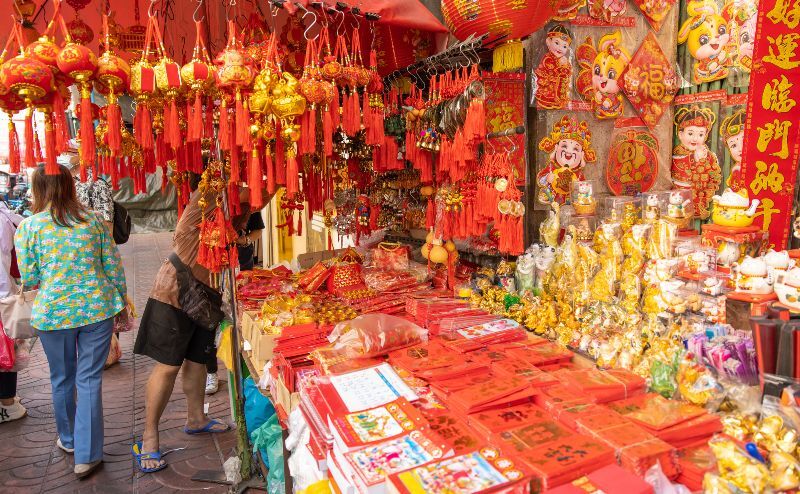
If anybody visiting Bangkok wants to see Chinese New Year activities, New Year’s Eve is the day to do it. Temples and shrines will be packed with locals, all offering merit to their gods. The streets in certain areas (see below) come alive with street-food stalls, dragon dancers, and other Chinese-style entertainment like acrobats.
There are three main places in Bangkok to join in the fun:
Yeowarat (Chinatown)
Yaowarat is Bangkok’s Chinatown; the entire area comes alive with red lanterns up and down the streets. Yaowarat has something to see every night of the year, times that by about 100, and that’s Chinese New Year’s Eve. The main difference is that some roads are closed to traffic, allowing room for all the additional revellers.
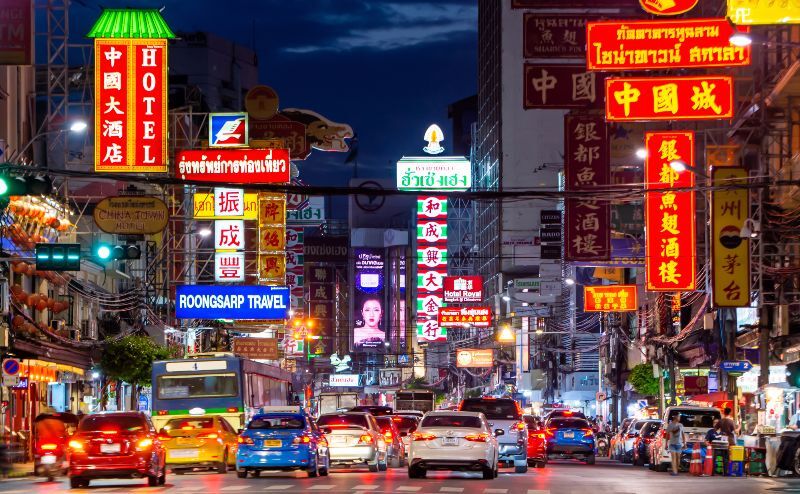
Wat Mangkon Kamalawat is the predominant Chinese temple in Yaowarat and is worth visiting if you can get anywhere near it on the day.
If you’ve never been to Chinatown for New Year’s Eve, it’s definitely a bucket-list activity.
Talad Noi
Talad Noi is the next suburb east of Yaowarat, yet it’s more subdued. You’ll still see red lanterns in many houses and shops, and there will be a smattering of street food and street dancers, but nothing like Chinatown.
It’s the home to Chow Sue Kong Shrine, the oldest Hokkien Chinese shrine in the city.
Charoen Krung Road
Just south of Yaowarat is Charoen Krung Road, just like Talad Noi it’s a lot more laid back. It’s worth wandering up and down the street to see the prettily decorated houses and storefronts. You’ll find locals celebrating out in the street.
If you time it right, you may just see a dragon dance outside a shop. This is a popular tradition during these couple of days and is believed to bring good fortune and lots of success to the store in the coming year.
Chinese New Year Dining
As feasting is the mainstay of the Chinese New Year celebrations in Bangkok, several hotels and restaurants have put together some unique menus for this period.
Shangri-La Hotel
Situated right on the Chao Phraya River just south of Yaowarat, the Shangri-La Hotel is a perfect place to dine on traditional Chinese food while enjoying impressive river views.
For the three days, 9–11 February, there are two set menus to choose from. The appropriately named Fortune and Prosperity sets are available for a minimum of 4 guests at the following servings:
- 9 February – Dinner
- 10 February – Lunch & Dinner
- 11 February – Lunch
Xin Tian Di
On the 22nd floor of the Crowne Plaza Lumpini Park, you can enjoy a Chinese New Year’s feast for lunch at Xin Tian Di. This menu is available from 9–11 February only and is for groups of 10 or more people.
There are three menus to choose from:
- The Prosperity Feast Set
- The Wealth and Fortunes Delight Set
- The Jade Emperor’s Feast Set
The meal is accompanied by a lion dance and a fortune teller on New Year’s Day, February 10.
Savio
At the Chatrium Grand in Bangkok, Savio has a lunchtime special on February 10. Enjoy a feast of savoury dishes, including Peking duck, lobster, and premium dim sum. There’s also a dragon dance performance and a chance to win a grand prize.
Year of the Dragon: The Chinese Zodiac & What it Means for 2024
For 2024, we look forward to the Year of the Dragon. But what does this mean in Chinese culture, and how will it shape the celebrations in Bangkok?
2024 is the year of the wood dragon, and anybody born in 1928, 1940, 1952, 1964, 1976, 1988, 2000 or 2012 will be most keen to celebrate this year.
The Chinese Zodiac holds significant importance, with the Dragon being regarded as a symbol of strength and enchantment. It represents wisdom, power, and prosperity, which is why the Dragon is highly respected. The Dragon is not merely an emblem of strength and knowledge but a bringer of good fortune and prosperity.
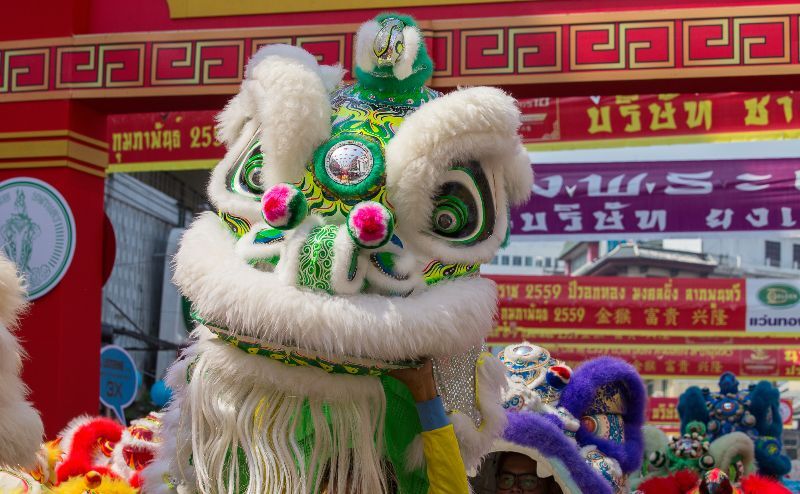
Come to Bangkok for Chinese New Year
There you have it; while not one of the largest celebrations in the world, Bangkok still does its piece to help ring in the Chinese New Year.
Venture out to one of the three areas to join in the street parties or feast on one of the limited-time menus at a hotel restaurant.
I hope to see you in Bangkok this February.
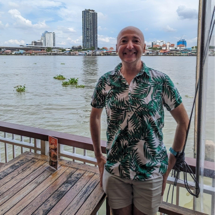
About the author: Stephen left Australia in 2016 with a one-way ticket to Thailand
and hasn’t been back since. Seven years later, he’s “living the ex-pat dream”, married and settled down; he and his partner travel across Thailand competing in half-marathon running events and sampling coffee at cafes.
